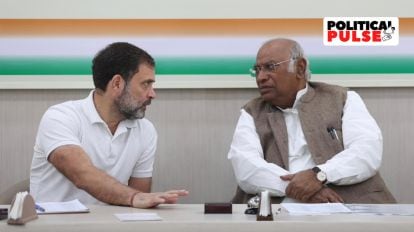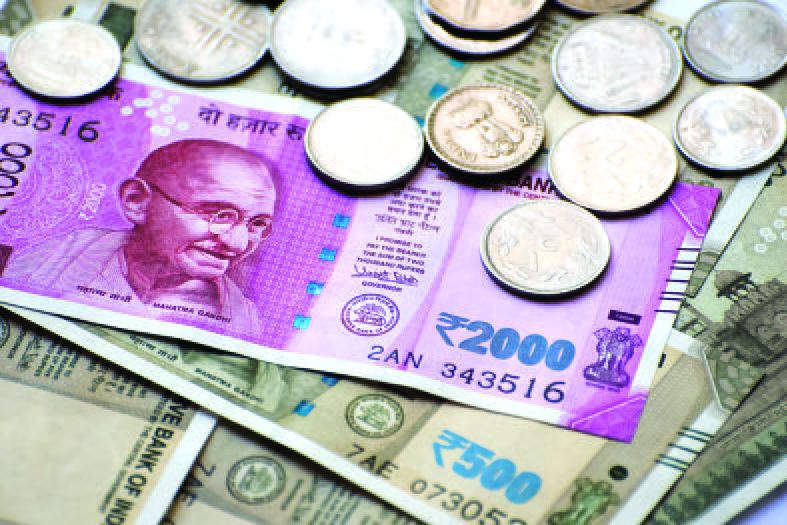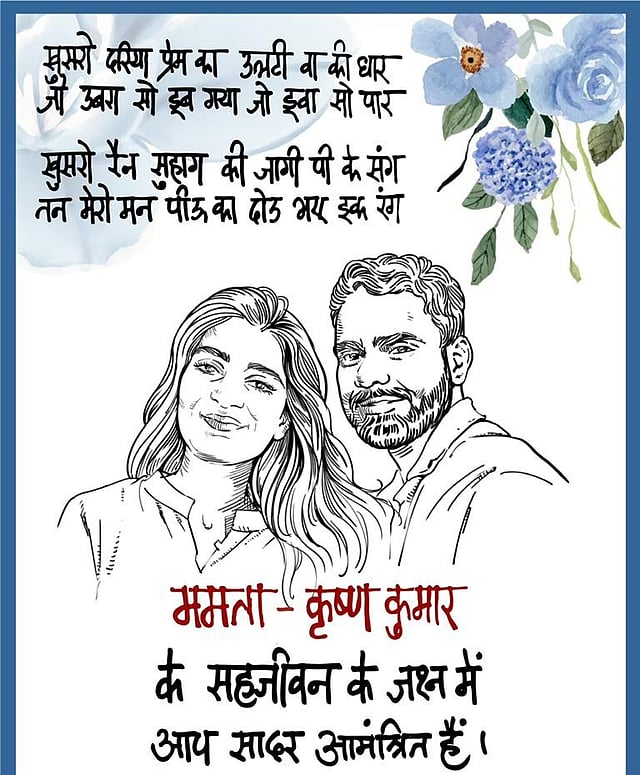17.03.2024.Untouchables from.Sivaji.ceo.chennai.26.
In Lok Sabha polls 2024, Congress hopes for a repeat of 2004, stares at heartland challenge
Congress party has been struggling to build a narrative that BJP can be defeated and that INDIA bloc can be its credible alternative, with the latter yet to come up with a common roadmap.
 The Congress hopes Rahul’s Yatras -- the second one centered around the theme of “Nyay” -- have struck a chord with the people. (Express file photo by Amit Mehra)
The Congress hopes Rahul’s Yatras -- the second one centered around the theme of “Nyay” -- have struck a chord with the people. (Express file photo by Amit Mehra)Rahul Gandhi has walked the extra mile, while his party Congress has swallowed pride and joined a band of disparate Opposition parties to stop the Narendra Modi juggernaut and announced, perhaps for the first time, a raft of poll promises even before the election schedule was announced.
Despite these unprecedented political moves, the Congress is entering the Lok Sabha battlefield with just a flicker of hope of a repeat of the 2004.
- 62 given relief under SC/ST Act in Sirmaur
62 given relief under SC/ST Act in Sirmaur
Rs 71.45 lakh has been distributed in 51 cases
Updated At: Mar 16, 2024 09:12 AM (IST)

Nahan, March 15
A district-level vigilance and monitoring committee meeting was held here today under the Scheduled Caste and Scheduled Tribe (Prevention of Atrocities) Act. While presiding over the meeting, Sirmaur Deputy Commissioner Sumit Khimta said a relief amount of Rs 71.45 lakh had been distributed to 62 victims in 51 cases of the district during the last three-and-a-half years.
Immediate relief should be provided
The relief amount should be provided to the victim immediately as per the rules. The cases of any kind of atrocities against people belonging to the Scheduled Caste and Scheduled Tribe communities should be taken seriously. — Sumit Khimta, Deputy commissioner
He said a total of 53 cases were registered under the Act during 2021 to March 2024, out of which 31 cases were pending in the court and 10 have been disposed of.
He said apart from the relief amount the victims, ration, utensils, financial support etc. were also provided to the victim’s family.
The Deputy Commissioner said the relief amount should be provided to the victim immediately as per the rules. He added that cases of any kind of atrocities against people belonging to the Scheduled Caste and Scheduled Tribe communities should be taken seriously.
He said cases of any kind of discrimination and untouchability in any school or Anganwadi of the district were being closely monitored.
He said during the last three months, a relief amount of Rs 2 lakh has been released in favour of four victims.
Crucial for BSP, LS polls will decide future of Dalit politics in U.P.

However, for the BSP it is a crucial election that will determine the future of Dalit politics in Uttar Pradesh. The support base as well as votes of the BSP have been shrinking post 2007 U.P. assembly election when it had formed majority government in the state.
From 30.43% in 2007, the BSP’s vote share declined to 12.88% in 2022 assembly election. Yet, it remains a force to reckon with in U.P. politics due to the unstinted support of the Jatav community that constitutes largest chunk of 23% Dalit voters in the state.
It remains to be seen whether the BSP with Dalit support be able to consolidate its position this time or the BJP, which made inroad into the Dalit vote base in the 2019 Lok Sabha election, will succeed in breaching the last BSP fort by winning the support of the Jatav community to consolidate its hold over the Dalits in the upcoming general election.
The Samajwadi Party is also working on PDA “Picchda” (backward), Dalit and “Alpasankhyak” (minority) formula to win the support of Dalits and OBC. The BSP is working on Dalit- Muslim-OBC formula to win seats in the 2024 Lok Sabha polls.
The party has announced to field Muslim candidates from Muslim-dominated seats located in Rohilkhand region. They include Dr Mujahid Hussain from Amroha, Irfan Saifi from Moradabad, Anish Ahmed Khan alias Phool Babu from Pilibhit and Majid Ali from Saharanpur Lok Sabha seats.
There is a clear indication that the BSP will cut into the Muslim vote base of the INDIA bloc. It has announced to field a Jat candidate from Bijnor, a Dalit from Agra and a Brahmin candidate from Ambedkar Nagar seat thereby ‘upsetting’ the strategy of the NDA.
Confident that the BSP will regain hold over the Dalit community in this election, Mayawati called upon the supporters to mobilise their resources in the Lok Sabha election. After the launch of the BSP in 1984, Mayawati toiled with party founder Kanshi Ram to spread the base of the party in Uttar Pradesh.
She created history on June 3, 1995 by taking oath of office as first Dalit woman chief minister, emerging from the churning of the Mandal revolution and the painstaking coalition of Dalit and backward communities crafted by her mentor Kanshi Ram.
In 2007, she achieved an even more impressive feat, forging a coalition of extremes between Dalits, Muslims and Brahmins as she swept to power with the first full majority government in almost a decade. In the successive assembly and Lok Sabha polls, the reputation of jumbo (BSP poll symbol) was in tatters due to definite defeats that sent signal that party’s hold over Dalits was loosening.
The party that once ruled the state fell behind small parties like Apna Dal (S), NISHAD party and the SBSP that spread by eating into the BSP’s OBC vote base. Mayawati named her nephew Akash Anand as her political successor in December last year to send a message that she was infusing young blood into the party organisation. Earlier, she had appointed her brother Anand Kumar as party’s national vice president.
Leaders of rival parties hit back alleging that Mayawati was promoting dynasty in the cadre based party. “If Mayawati wishes for a comeback, she will have to go to the basics—regroup Dalit-backward communities and promote ‘missionary soldiers’ in ticket distribution as an insurance against desertion,” Dalit ideologue AR Akela said.
But it will be tough. Politics in the state is getting bipolar and the BSP is getting squeezed out. Many Dalit communities are no longer tied by ideology and the BJP has been proactive in winning them over by welfare promises and grassroots party positions.
Old leaders are discouraged by turncoats getting tickets. The party is battling the perception that it is out of sync with 21st century campaigns and its narrative of giving dignity to Dalits appears to be losing steam.
Addressing party workers Kanshi Ram’s birth anniversary on Friday, Mayawati called upon party workers to resolve to get a good Lok Sabha election result and said this will be the true tribute to the party founder. The BSP will go into the Lok Sabha election with the slogan “Manyavar Kanshi Ram aapka mission adhura, behenji karegi pura (BSP chief Mayawati will fulfil the unfinished mission of Kanshi Ram).”
The preparations of the NDA and INDIA bloc and silence in the BSP office indicate that time is running out for the four-time Dalit chief minister to fulfil her mentor’s mission.
 Hyderabad | Mancherial Dalit Woman Ends Life Over Not Getting Married
Hyderabad | Mancherial Dalit Woman Ends Life Over Not Getting MarriedShe had made an attempt to die by suicide by jumping in front of a moving train, but was saved by locals two months ago.

Mancherial: A 41-year-old Dalit woman was found dead on the railway tracks, allegedly after she jumped in front of a train in Bellampalli on Sunday. She was reportedly depressed over marriage alliances not working out for her.
According to Bellampalli government railway police, Kotturi Sumalatha from Tekula Basthi in the coal belt town resorted to the drastic step as she was upset over being unable to get married even after she turned 40 years. She was dejected when she was rejected by several alliances.
She had made an attempt to die by suicide by jumping in front of a moving train, but was saved by locals two months ago.
Rajasthan: Dalit Couple to Tie Knot — Bearing Witness to Constitution, Not Holy Fire; To Take 7 Resolutions Instead of Religious Bandwagon

Jaipur: In a first-of-its-kind marriage, a Dalit couple in Rajasthan’s Bhilwara district is set to tie knots by taking oath on Constitution. They will walk seven steps together and take seven resolutions.
As a step towards a social change, Mamta Meghvanshi and Krishna Verma (both lawyers) will get married on March 18 at Ambedkar Bhawan in Sidiyas village of Mandal tehsil. The bride is the daughter of famous Dalit social activist Bhanwar Meghvanshi.
By solemnising marriage in such an unconventional way, the duo wants to give out a message of “love, compassion, affection, generosity, justice and equality”. Instead of dowry, books and plants will be gifted to the bride and groom at the wedding. Along with the resolution to create a new society, a resolution will also be taken to preserve all the grazing animals, birds, rivers, mountains and environment.
Following the footsteps of Dr BR Ambedkar and his wife Dr Sharda Kabir, the couple will neither perform the ritual of agni pradakshinam (walking around the fire with hands linked or with the ends of their garments tied together), nor will there be noise of DJ tunes in the marriage ceremony. It will be conducted by Bhante Dr Siddharth Vardhan — who will recite Mangalsutra (Vedic hymns) during the Paanigrahan ceremony (one of the key steps of Hindu wedding ritual wherein taking bride’s right hand in his left, the groom accepts her as his wife).
After the marriage ceremony, the bride and groom will plant saplings.
How is it different from other marriages?
Writer and social activist Bhanwar Meghvanshi told The Mooknayak that his daughter’s marriage is free from dowry, pollution and traditions.
Generally, lagana lekhan (a pre-wedding worship that is held at the bride's house) is organised to decide muhurta (the auspicious date and time for the wedding) by a priest. The ritual is followed by a turmeric, sandalwood and mehndi (myrtle) ceremony. Pre-wedding shoots also happen these days. Then the wedding procession arrives.
The groom hits the pylon with the sword. Then both the bride and groom undertake seven rounds of holy fire. There is a tradition of visiting a temple to pay obeisance to gods and goddesses. Farewell is done by displaying the dowry. “No such ritual will be performed in my daughter’s wedding,” he claimed, adding that the marriage will take place under the Special Marriage Act. It can also be called a legal marriage.

What are those seven resolutions?
The bride and groom will take a pledge at every. By taking seven steps together, they will take seven different resolutions — which are as follows.
“In the presence of our family and loved ones, bearing witness to the Constitution of India, we take a pledge that from today onwards we will mutually partner in complementing each other’s life.”
“We pledge that our partnership will be based on mutual trust and equality. We will spend our lives and prosper by respecting each other and as friends.”
“We pledge that we will fulfill all the responsibilities of our life together with full devotion. Our collaborative life will be dedicated to the betterment of the country, the world and the society. We pledge that our conduct will be in accordance with the Constitution of India, justice, equality, liberty and fraternity. We will give each other respect, honor and dignity.”
“We take a pledge that we will protect, promote and respect all the creatures, nature and environment in the spirit of goodwill, harmony, friendship and cooperation. And we will be friendly towards all living beings, animals, birds, rivers, ponds, mountains and seas.”
“We pledge that we will face difficult situations, negativity, disappointments and moments of struggle in life with complete patience, compassion, generosity and understanding. We will support each other.”
“We take a pledge that even if there is any change in our relationship with time, we will respect each other. We will look back on the time spent together with friendship, harmony and satisfaction. We will help each other to get out of any situation.”
“We pledge in your presence that we will draw inspiration from our forefathers like Tathagath Gautam Buddha, Saint Kabir, Ramsa Pir, Jyotiba Phule, Savitri Bai, Fatima Shaikh, Baba Saheb Ambedkar, Bhagat Singh and Mahatma Gandhi and with the strength of our ancestors and nature.”
What is the relevance of these resolutions?
Mamta said the resolutions are based on constitutional values — equality, mutual trust, respect and dignity for each other and no discrimination of any kind on the basis of gender and age. “This will bring a cultural change in the society,” she said.
She further said, “Generally, in a marriage, seven rounds are taken around the holy fire — considering it as a witness. Half the time, the groom leads the bride. Pandits chant mantras, they show gender discrimination. Most of them give less importance to women and more importance to men. The girl has to promise that she will do anything as per her husband’s wish. She will be the owner of all the property. Instead of making rounds around the fire, we decided to take resolutions at every step. By doing this, we are creating a new world where there is room for everyone.”
Mamta further said she is from Mewar region of Rajasthan where, even today, the daughter is tied to the chains of social traditions. “I believe that when I put forward a demand, why can’t the boy fulfill it? I made the decision during my studies. I had decided that I would not marry with such traditions. My father supported me in this. Society wants to forget real life and live in reel life.” she concluded.
On the other hand, the groom said it was his dream to move away from pomp and show while getting married.
“My family supported this. The bride’s family believes in constitutional values. So, we decided to get married under the Special Marriage Act. Education teaches us to spend our lives in accordance with the Constitution. Spending money on weddings has become a hobby of the rich. Even the poor are ruining themselves in order to compete with their richer counterparts in the society. That’s why we decided to get married this way. Two people want to live together with consent: this is the only meaning of marriage,” he said.
What message does marriage intend to give to society?
Bhanwar said that there is no need to live life in fear of any religious supernatural forces. “This is the decision of your life. Take it wisely. The Constitution should be considered supreme in life. This is the greater message of this marriage at a time when the Constitution is under constant threat,” he said, adding that the Constitution, which has given people the status of human beings, must be valued.
“We should become a lawful society. Start living together in life with the resolution to say no to traditions and dowry,” he concluded.
- Translated into English from Hindi by Tarique Anwar






Comments
Post a Comment